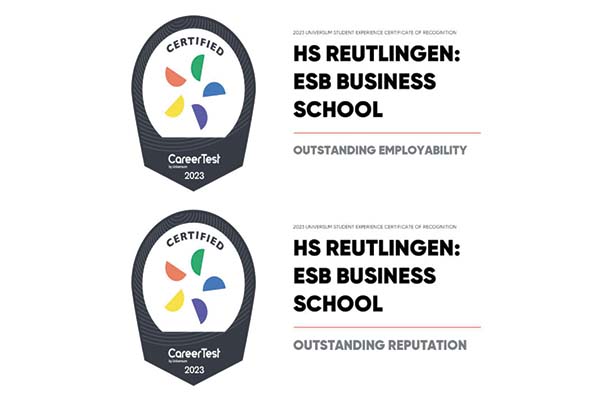How much AI does the job market need?

Humans vs AI is not about competition but cooperation. All five speakers at the 28th ESB Economic Forum, which is organised each year by students at the ESB Business School of Reutlingen University, were agreed about this. But other questions led to heated debate in the public panel discussion. Does Artificial Intelligence offer the solution to the skills shortage? How well-prepared is Germany with regard to AI? Are the new technologies a threat to democracy?
Even Falk Borgmann, Head of Consulting at Deepshore, an IT company operating in the field of AI-based Research and Development, is finding it hard to keep an overview: “It’s not just laypeople who think it – even from an expert’s point of view we’re experiencing an extreme boom. The innovative capacity of AI at the moment is incredible.” Borgmann adeptly explained the principles of generative AI – like those used in ChatGPT – to the audience at the start of the ESB Economic Forum.
Beside him sat the second speaker of the evening, who is also extremely well-versed in Artificial Intelligence. Rebecca C. Reisch is the managing director of Tübingen’s Cyber Valley, Europe’s largest research consortium specialising in Artificial Intelligence. Compared to other federal states, Baden-Württemberg is already well-prepared, said Reisch. Yet this is no reason to rest on our laurels: “In Germany we talk about ‘risk capital’, when we invest money in new ideas. This automatically has a negative undertone. And we are still very ‘undigital’, while major international corporations are undertaking ground-breaking research. We urgently need to open up in this area.”
Liberal party member of the Bundestag and parliamentary state secretary Michael Theurer endorsed her view: “We are holding a very risk-oriented discussion now. But it’s clear that AI will be unavoidable in many sectors in future.” Theurer recommended an international code of conduct to regulate Artificial Intelligence.
The discussion repeatedly returned to one question above all: What effects will Artificial Intelligence have on the jobs market? Kerstin Wagner, Executive VP Talent Acquisition at Deutsche Bahn, considered this issue in the context of the skills shortage: “We’re already data-driven in our work, in order to address applicants more precisely. At the same time we’re considering the future, because we have to know what qualifications our team will need in future.” To reveal this Deutsche Bahn produces forecasts of how the job profiles at the company will change over the coming years and what role technology will play. “We haven’t discovered a job yet that can completely be replaced by AI. But we are seeing that many activities will change markedly,” said Wagner.
Dr Hermann Gartner, research associate at the Institute for Employment Research (IAB), also doubts Artificial Intelligence means the demise of the working world: “We’ve almost full employment in some sectors at the moment and that’s good news to begin with. It’s often been predicted in the past that technology will replace all of us one day. But this horror scenario still hasn’t come to pass. Highly-qualified people in particular will continue to be in demand, despite AI.”
What qualifications do we need to hold our own in the (work) world alongside Artificial Intelligence? The experts at the ESB Economic Forum believed that curiosity, the desire to learn, a willingness to change and media skills are key factors. The latter above all would be crucial to ensuring Artificial Intelligence does not become a threat to democracy. All the panel participants were agreed that we have to be alert to this risk and act against it. Nevertheless, at the end of an exciting discussion, Michael Theurer said: “We can’t duck the subject of AI , we can’t regulate it out of existence. We have to engage actively, with all the reservations we have.”
About the ESB Economic Forum
The ESB Economic Forum 2024 was chaired by Dr Julia Hagel. The public event was organised for the 28th time by students at the ESB Business School. Members of this year’s core team were Marina Bosnjak, Vanessa dos Santos Keller, Alexandra Knauer, Marit Lemke, Lea Nachtigall, Charlotte Seidel and Anaïs Wunsch.























